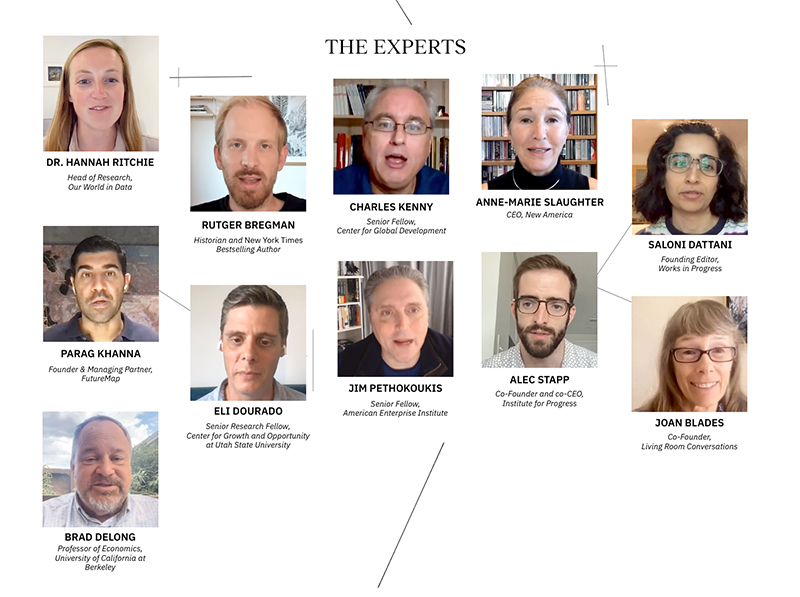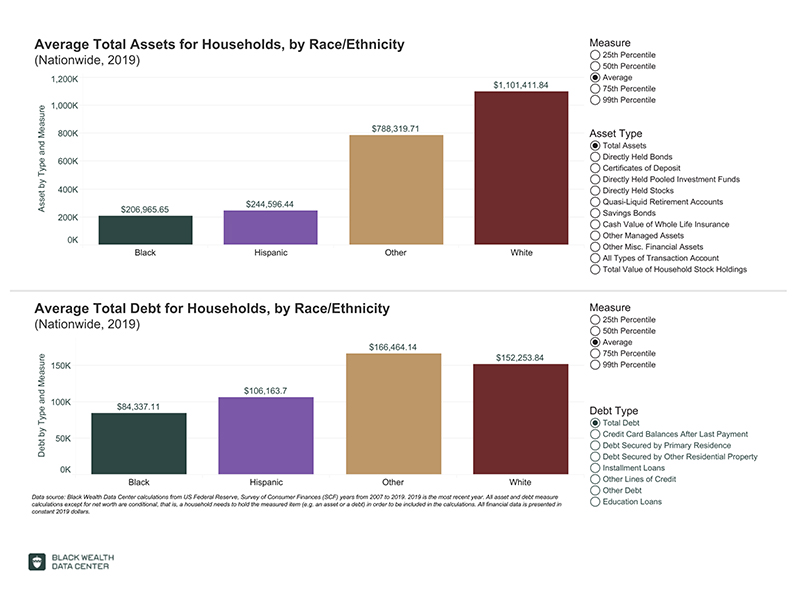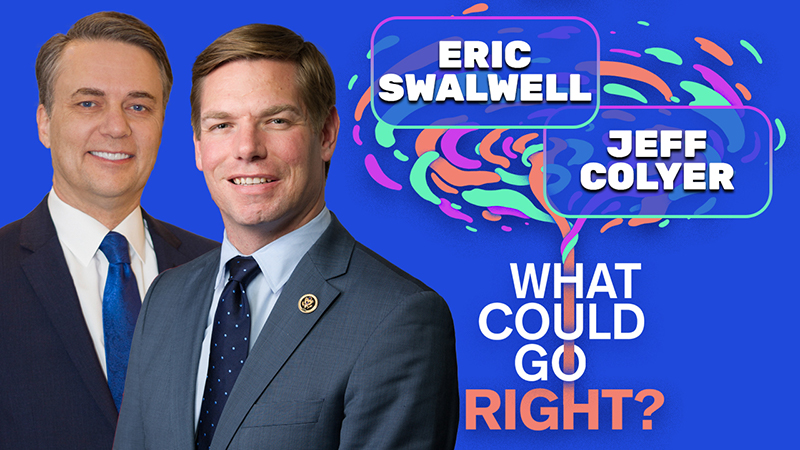Volcanoes are erupting in The Philippines, but on-fire Australia received some welcome rain. The Iran war cries have been called off and The Donald’s military powers are about to be hamstrung by the Senate. Meanwhile, his impeachment trial is starting, and we’re all on Twitter for a front-row seat.
What Could Go Right? Politics is pro wrestling
Bipartisan legislation, wealth accumulation, and the possible end of the pandemic
This is our weekly newsletter, What Could Go Right? Sign up here to receive it in your inbox every Thursday at 6am ET. You can read past issues here.
Cool new ventures
On the podcast: global vaccine equity and how to make American bipartisanship a reality
Yesterday marked the launch of Season 3 of the What Could Go Right? podcast. While we’re still convening the smartest people we know, this season we’re focusing more on the kind of stories we cover in this newsletter: good news that may have escaped notice. Our first episode covers the new malaria vaccine and the controversy over the global Covid-19 vaccine rollout—and what Bill Gates has to do with it.
Then we connect a Democrat and Republican—Congressman Eric Swalwell, who represents California’s 15th congressional district, and Jeff Colyer, former governor of Kansas—for a conversation about whether the United States’ political parties can move forward together. They tell us about the bipartisan legislation that goes under the radar, discuss whether the Democrats have gone too far with existential political messaging over the last couple of decades, and point out something we should all realize about politics, especially on social media. It’s like “pro wrestling,” says Swalwell. “What happens in the ring and what happens backstage is not the same thing.” Listen to the first episode here.
In collaboration with Big Think: an expert roundtable on progress
Progress! It sounds so grand. But what counts as progress, and how do we accomplish it? (Actually, various Progress Network members sometimes have different ideas of what it means and how to get there, and we consider that part of the progress process.)
We were delighted to partner with Big Think on their progress issue, for which we assembled a roundtable of our members and other progress thinkers in order to put together a “progress agenda” for the world. What are the biggest opportunities for progress right now, and what are the barriers? How do we ensure that progress benefits everyone? Take a look at the roundtable’s answers here.

On that big, first question—what is progress?—we loved TPN Member Parag Khanna’s definition of “sustained civilizational advancement,” encompassing the material and non-material alike and knowing no national or even environmental boundaries. Member Anne-Marie Slaughter put a finer point on it. She sees progress as maximum benefit for a maximum number of people with minimum harm.
Building Black wealth
Indicators of progress are imperative. “If you’ve ever trained for any kind of sport, you need to know you’re getting faster or stronger,” says Slaughter in the Big Think roundtable. “Societies do better when we have those metrics. Now, they are often in very short supply.”
While there are indicators that the US has made immense progress when it comes to interpersonal racism, wealth disparities by race seem entrenched. And per Slaughter, it’s difficult to find robust data on them. So while a new data aggregator called the Black Wealth Data Center might not be the kind of thing that makes headlines, we are stoked about it. The site, funded by Bloomberg Philanthropies, is meant to help policymakers “develop and implement effective programs and policies to increase racial wealth equity.”
A quick spin around the site shows that progress in this area is needed, to put it mildly. The figures are stark. In a 2019 survey, white families’ median wealth was $188,200; mean wealth, $983,400. For Black families, those figures are $24,100 and $142,500, respectively. While Black families are currently growing wealth, they are still recovering from larger declines in wealth lost during the Great Recession. There are large wealth gaps, too, between white and Hispanic families.

On the topic of wealth accumulation and developing a just society, we also have our eye on a couple of no down payment experiments. Bank of America, JP Morgan Chase, and TD Bank have introduced “zero down payment loans for first time homebuyers in predominantly Black and Hispanic neighborhoods.” An explainer from NPR here.
We’re also waiting to see if a bipartisan act called the Homes for Every Local Protector, Educator, and Responder (HELPER) Act will have legs. It would allow certain law enforcement officers, firefighters, EMS workers, and K-12 teachers to buy houses without a down payment and with “more affordable mortgage financing.”
Both of these offers apply to homebuyers of any race.
Before we go
Denmark is the second country, after Scotland—and the first United Nations member—to commit funds toward climate change-caused “loss and damage” in vulnerable countries like Pakistan and Bangladesh. We’re not so impressed by the $13 million commitment, which seems paltry, but more peer pressure in this arena would be good. That news makes for an interesting pairing with this article from The National Interest that asks if we can align third world development with a net-zero world. Many people don’t know that while rich countries are decarbonizing, poorer countries are not. They want to provide their citizens with the quality of life the developed world already has, and they need energy to do it. Why isn’t that the central discussion of climate policy?
It’s interesting to see the money start to flow from President Biden’s infrastructure legislation. Say hello to the $900 million just approved for 34 states and Puerto Rico to build out a network of charging stations. Want to buy an electric vehicle? We have a guide to common questions here, and The New York Times has one on how to save some money doing it here.
The end of the pandemic is “in sight.” Says who? The WHO, that’s who. (Sorry—we can hear the groans.) Alongside the news that weekly reported deaths from Covid were the lowest they have been since March 2020, The World Health Organization has announced that we could end the pandemic, if we can get our you-know-what together. If the pandemic ends, that doesn’t mean, of course, that there won’t be future waves of infection or new variants to address. But Dr. Maria Van Kerkhove, Covid-19 technical lead at the WHO, says both could happen without accompanying “waves of death.” We’ve come a long way in two years.
We’re just wondering: would you eat this purple tomato or get a manicure done by a robot?
Below in the links section, building a new kind of wind turbine, talking to whales, composting humans, and more.
Progress Pop Quiz
This one is tough: of the 100 most populous US cities, can you name one of the five where rents decreased the most month-over-month, according to data from August? As per usual, we’ll publish all five answers in the next edition of the newsletter, along with the names of any readers who guess correctly. Email your guess to hello@theprogressnetwork.org or comment below.

Vaccine Equity and Bipartisan Reality

In this week’s return of the What Could Go Right? podcast(!), we ask: What’s the impact of the new malaria vaccine with “world-changing” potential? Was there a lack of scrutiny over the worldwide Covid vaccine rollouts? Is there an update on the UN’s Sustainable Development Goals? Plus, we talk with Congressman Eric Swalwell and Jeff Colyer, former Governor of Kansas, about the process, practicalities, and hope for a bipartisan future. | Listen to the episode
Progress, Please
(Found good news? Tweet at us @progressntwrk or email.)
Other good stuff in the news 🐸
Environment:
- The ozone layer is healing | DW
- Dutch rewilding project turns back the clock 500 years | The Guardian
- Could the nation’s coal plant sites help drive a clean energy transition? | Department of Energy
- Tiny new tree frog species found in rewilded Costa Rican nature reserve | Mongabay
Science & Tech:
- This startup wants to build a radically powerful new wind turbine | Freethink
- Quantum batteries: strange technology that could provide instant power | New Scientist
- Dutch students have invented a zero-emissions car that captures carbon as it drives | Euronews
- An EV with 600 miles of range is tantalizingly close | Inside Climate News
- Talking to whales: Can AI bridge the chasm between our consciousness and other animals? | The Guardian
- The search for intelligent life is about to get a lot more interesting | The New York Times
Politics & Policy:
- California becomes first US state to begin ranking extreme heat wave events | USA Today
- New York Gov. Kathy Hochul signs NYC class size bill into law | Chalkbeat
- Tokyo plans to require that new homes have solar panels from 2025 | The Japan Times
- Italy bans slaughter of male chicks, sparing up to 40 million birds a year | Plant Based News
- Human composting: California clears the way for greener burial method | The Guardian
- North Sea nations plan huge expansion of wind power by 2050 | AP
- US court revokes permits for plastics plant in Louisiana’s ‘Cancer Alley’ | The Guardian
Public Health:
- Do new options mean it’s time men took more responsibility for birth control? | Euronews
- Scientists hail autoimmune disease therapy breakthrough | The Guardian
- ‘The future of hospitals’: flexible space for the next pandemic | The New York Times
- Two antibodies identified in Israel can fight all known COVID strains, study finds | The Times of Israel
- The Nigerian project helping babies to be born free of HIV | The Guardian
- New treatments for meth addiction might be around the corner | STAT
Society & Culture:
- The green dream to rebuild a sustainable Ukraine from the rubble of war | Politico
- The problem with “decolonizing” global health | Persuasion
- A skate park, health center, and library will open under one innovative roof in Houston | Texas Monthly
- Runners can identify as nonbinary in next year’s Boston and London marathons | NPR
- Go ahead, ask for help. It makes people happy | Futurity
Economy:
- Child poverty in the US was stagnant—and then something changed | Vox
- Bloomberg Philanthropies unveils racial wealth gap database | Axios
- Companies and nonprofits expand efforts to hire veterans | The Wall Street Journal
- Firms in four-day week trial will make it permanent | BBC
- Amazon, Pfizer among companies pledging to hire 20,000 refugees | The Wall Street Journal
TPN Member originals 🧠
(Who are our Members? Get to know them.)
- Is being transgender a medical condition? | Jennifer Finney Boylan
- Establishing a new right to ‘intimate privacy’ | Danielle Citron
- Let Joe Manchin have his pipeline | Matthew Yglesias
- Climate migration, geopolitics, real-estate and agriculture in a world impacted by climate change | Parag Khanna
- A conversation with Cato Institute scholar Scott Lincicome about industrial policy and Bidenomics | James Pethokoukis
- After Dobbs: Does ‘big tent’ feminism exist? Should it? | Anne-Marie Slaughter
- How your friends determine your wealth, health, and happiness potential | Nicholas Christakis
- 11 ancient solutions for modern malaise | Arthur C. Brooks
- Why is there still no strategy to defeat Donald Trump? | David Brooks
- Trying to prove you’re not a racist | John McWhorter
- Robert Kagan on America’s future, foreign policy realism, and the war in Ukraine | Yascha Mounk
- Inflation? The workforce is the bigger problem | Tyler Cowen
- The attention economy | Scott Galloway
- Will Putin’s energy strategy backfire? | Jason Bordoff
- Three paths toward an endgame for Putin’s war | Thomas L. Friedman
Department of Ideas 💡
(A staff recommendation guaranteed to give your brain some food for thought.)
The Little Mermaid and Sen’s paradox | Imperfect Information
A live-action remake of The Little Mermaid is due for release in May 2023, starring Halle Bailey in the title role.
Why we picked it: The current controversy over the Little Mermaid casting is a jumping off point to discuss how to build a society of people with “individual values that respect each other’s personal choices.” —Emma Varvaloucas
Until Next Time
To achieve goals, realistic deadlines are key. 👇


